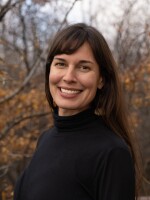The merciless force of a pandemic is nothing new to Southwest Alaska. Many people in the region have grown up with stories of the 1918 flu epidemic killing whole villages. KYUK’s Julia Jimmie heard those tales from her mother and aunt, who heard them from their parents, some of whom were there when death came to visit.
Julia Jimmie tells the story with excerpts from Elders Esther Green and Eula David.
"Yeah, I heard stories. I think my parents’ generation are the ones who heard first or secondhand accounts of the early 1900 pandemic that devastated the area. They call it 'quserpak,' the big flu," said Jimmie.
“They checked every dwelling place; sod houses. And in one sod house everyone was dead, except there was there was this little boy sitting right next to his mom, dead mother. And he could just try to take milk out of her breast,” said Green.
"Green is 82. She and I both heard the story of a man finding a boy and his mother," said Jimmie. "His mom had died, and he was still breastfeeding from his mom. Whenever he got hungry he would go to his mom and breastfeed. So that man took that child home and raised him.
“He grew up. It was no problem for those two. In his manhood, he was a successful hunter and he helped those two aging parents to be a young man and a good hunter. He survived,” said Green.
"When it first started, there were so many people dying. They would check on houses, and whenever there was no one found alive in the houses they would collapse that sod home and bury them like that," said Jimmie.
“My grandmother used to tell me a lot of stories including 'cangerlagpak,' the great big sickness. Maybe similar to what we went through this winter. They used to make it sound like very big sickness with no cure,” said David, who is 89. "I’ve always believed those stories. I didn’t always hear them only from my parents and not just from my aunt. We heard them from other villages, from other Elders."
“You know they believe that if they make fun of something, it would stop," said David. "After how many months of this sickness, there was one old man that died in the gathering place, they call it 'qasgiq.' One of the men said, there was so many people died, so many, so many people, 'What do we do with this body? Let’s make fun of this body. Instead of taking him through the door, let’s tie him somewhere, maybe on the neck and pull him out from the window up there.' And they started laughing. They just laughed so much. And then they said this was the last death up there in that area,” David said.
'I didn’t hear that one," said Jimmie, "but I heard a story about these two men. They were taking care of dead bodies and they were so tired. They were getting so weak. They were probably sick themselves. And this one body, they were so tired, they dropped it and the body rolled down the hill. One of them just started laughing, and the other one joined him. They both started laughing. It wasn’t funny, but that’s how they reacted. They just laughed and laughed. I guess it was a ridiculous situation. Because they made light of the situation, they laughed at the sickness, so it went away."
"Yeah, these things are what I heard over and over again when I was growing up," said Jimmie. "It was only a person who loves, who has love in their heart, will talk to people to teach them how to survive. Because when we come across something like this we will remember the stories and we will know how to survive, and that’s why they tell the stories."
That story was produced for KYUK by Katie Basile and Johanna Eurich.





